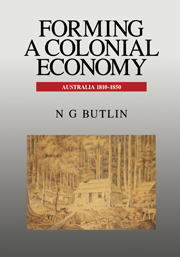Book contents
- Frontmatter
- Contents
- List of Tables
- List of Figures
- Acknowledgements
- Part I Forming an Economy
- Part II The Colonial Peopling of Australia: 1788–1850
- Part III Public Funding of Colonial Development: 1788–1850
- 5 Introduction
- 6 British Fiscal Characteristics
- 7 The Imperial Fisc in NSW and Van Diemen's Land to 1821
- 8 Broad Relations between British and Australian Fiscs to 1821
- 9 The Beginning of Local Budgeting: Real and Subterranean Budgets
- 10 The Conventional Legal Fisc in NSW: 1822–50
- Part IV The Colonial Australian Economy 1810–1840—A Historical, Statistical and Analytical Account
- Bibliography
- Appendixes
- Index
8 - Broad Relations between British and Australian Fiscs to 1821
from Part III - Public Funding of Colonial Development: 1788–1850
Published online by Cambridge University Press: 04 August 2010
- Frontmatter
- Contents
- List of Tables
- List of Figures
- Acknowledgements
- Part I Forming an Economy
- Part II The Colonial Peopling of Australia: 1788–1850
- Part III Public Funding of Colonial Development: 1788–1850
- 5 Introduction
- 6 British Fiscal Characteristics
- 7 The Imperial Fisc in NSW and Van Diemen's Land to 1821
- 8 Broad Relations between British and Australian Fiscs to 1821
- 9 The Beginning of Local Budgeting: Real and Subterranean Budgets
- 10 The Conventional Legal Fisc in NSW: 1822–50
- Part IV The Colonial Australian Economy 1810–1840—A Historical, Statistical and Analytical Account
- Bibliography
- Appendixes
- Index
Summary
The facts of fiscal dominance of Britain and of the presence of large numbers of convicts in the New South Wales settlement until 1840 inevitably narrow the focus in explaining the origins and development of public finance in eastern Australia. Certainly, various forms of political process influenced fiscal history, including the conflicts of interests of different groups. Nevertheless, it is not possible to seek these fiscal origins and developments primarily through the exercise of choice by free individuals and groups in Britain or in the Australian colonies.
Almost from the beginning, there was a conflict of interest between British officials and NSW residents. At least for the first 52 years of Australian history, NSW was a major convict receptacle for Britain. There is considerable debate as to whether there was also some imperial design in the initial decision to establish the colony. In NSW, the initial penal concept was rapidly altered, firstly by privatisation after 1792 and subsequently through the growth of non-convict activities broadening the range of private interest groups. For Britain itself, the revealed behaviour strongly suggests that there was an increasingly imperial interest in the Australian settlements. The Napoleonic Wars distracted British attention from the internal affairs of the colony and limited the flow of convicts.
- Type
- Chapter
- Information
- Forming a Colonial EconomyAustralia 1810–1850, pp. 68 - 70Publisher: Cambridge University PressPrint publication year: 1994



